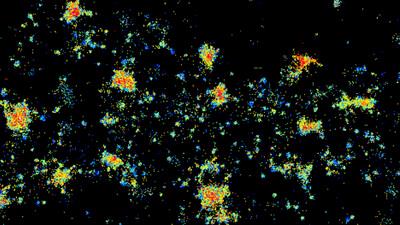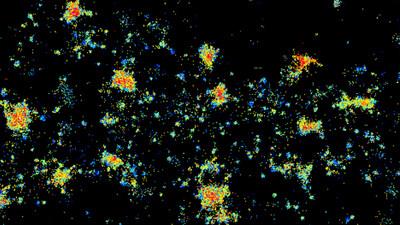
Putting Out A Brain On Fire
autoimmune disease called anti-NMDAR encephalitis. This is what happened to
Susannah Cahalan, a New York Post reporter who would go on to write the best-selling memoir Brain on Fire: My Month of Madness. Continue Reading

Cold Spring Harbor Laboratory's Furukawa lab is studying an autoimmune disease called anti-NMDAR encephalitis in collaboration with Professor Christian Geis' team at the University of Jena and the SYNABS research unit in Germany. Here, we see antibodies from a human anti-NMDAR encephalitis patient (purple) binding to NMDARs (green) in a mouse brain. Areas marked red indicate high levels of antibody binding.
Anti-NMDAR encephalitis can lead to hallucinations, blackouts, and psychosis, says Cold Spring Harbor Laboratory Professor Hiro Furukawa. It mostly affects women ages 25 to 35-the same age at which schizophrenia often presents itself. But what's happening in anti-NMDAR encephalitis is something else.
Furukawa specializes in NMDARs, brain receptors that play a critical role in cognition and memory. "In anti-NMDAR encephalitis, antibodies bind to those receptors and prevent them from working," he explains. As an autoimmune response, the brain becomes inflamed-hence, Brain on Fire.
While some treatments are available, their effectiveness varies depending on symptom severity. New research from the Furukawa lab may explain why. In a recent study, Furukawa and colleagues map how antibodies from three patients bind to NMDARs.
They find that the way in which each of the three antibodies binds to
NMDARs differs. The discovery marks an important step in gaining a fuller understanding of anti-NMDAR encephalitis, a condition first diagnosed in 2008. Furthermore, it suggests personalized medicine may be critical for treating this disease.
"Distinct binding patterns manifest in different functional regulation levels in NMDARs," Furukawa explains. "This affects neuronal activities. So, different binding sites may correspond to variations in patients' symptoms." Uncovering those correlations could lead to more precise therapeutic strategies. Imagine, for example, that scientists identify several binding sites common among encephalitis patients. Pharmacologists could then design new drugs to target these sites. But that's not all. Personalized medicine could also mean more accurate diagnoses, Furukawa says.
"It's still a rare disease, but it could be misdiagnosed or underdiagnosed. Therefore, we need to spread awareness. Could, for example, some schizophrenic patients have this disease? Could it be caused by antibodies?"
Currently, it's said that anti-NMDAR encephalitis affects one in 1.5 million people. Yet, in time, we may find it's more common than previously assumed. That's a scary thought. However, it could explain why existing psychiatric medicine does not work for some people diagnosed with bipolar disorder and other mental health conditions-a huge revelation for patients as well as the families and therapists who care for them.
About Cold Spring Harbor Laboratory
Founded in 1890, Cold Spring Harbor Laboratory has shaped contemporary biomedical research and education with programs in cancer, neuroscience, plant biology and quantitative biology. Home to eight Nobel Prize winners, the private, not-for-profit Laboratory employs 1,000 people including 600 scientists, students and technicians. For more information, visit
SOURCE Cold Spring Harbor Laboratory
WANT YOUR COMPANY'S NEWS FEATURED ON PRNEWSWIRE? 440k+Newsrooms &
Influencers 9k+
Digital Media
Outlets 270k+
Journalists
Opted In GET STARTED

Legal Disclaimer:
MENAFN provides the
information “as is” without warranty of any kind. We do not accept
any responsibility or liability for the accuracy, content, images,
videos, licenses, completeness, legality, or reliability of the information
contained in this article. If you have any complaints or copyright
issues related to this article, kindly contact the provider above.


















Comments
No comment